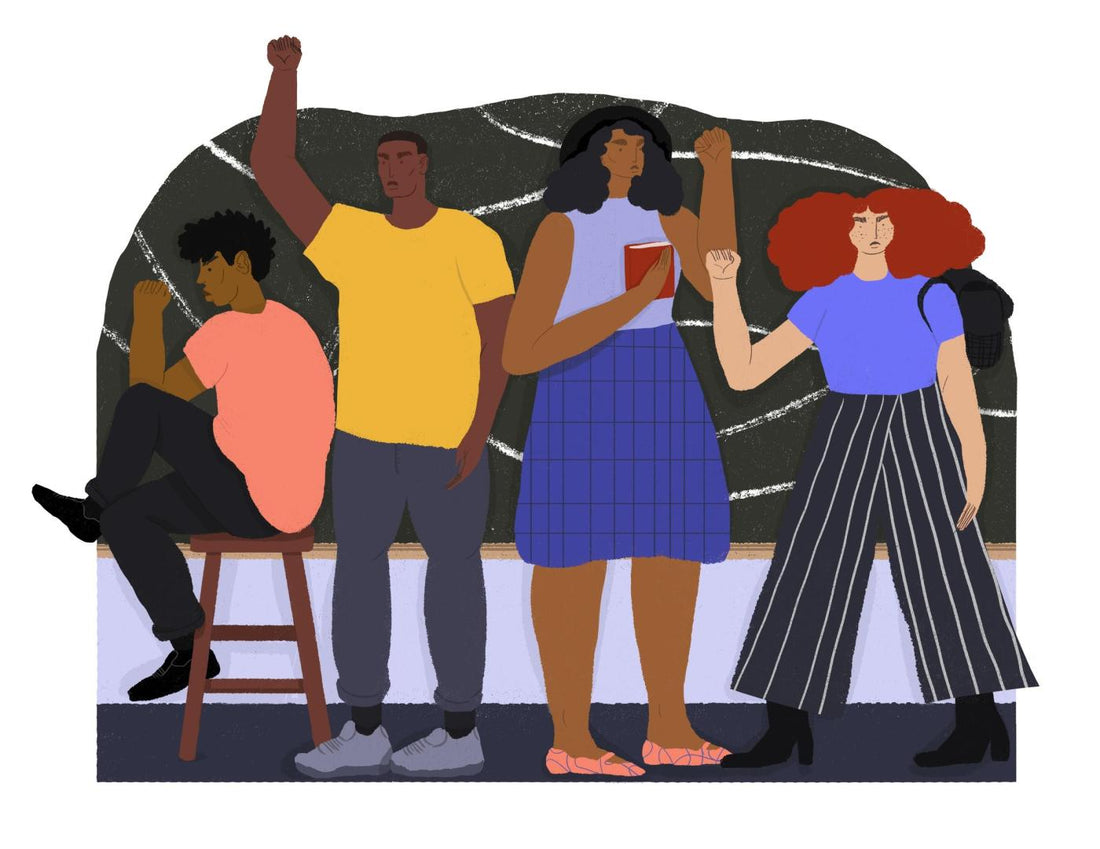
Why I Sell Activism Instead of College to My Students
WORDS: ALICIA-RAHEMA MOOLTREY | ART: LOVEIS WISE
The perspective with which we sell education to young people deeply impacts their receptiveness to it.
Many educators attempt to sell the idea of college and potential employment to students in order to get them to engage in the classroom. Rebuttals from pupils are all too real, “My cousin got a degree and she’s working at CVS.” “My sister is in so much debt and still don’t got a job.” It’s hard to argue against their real life cases of how college has failed their families and deferred their dreams. This is why I don’t sell college to my students - I sell activism.
I am a teacher who believes that education could be the most radical, paradigm shifting profession there is...

As an English Language Arts teacher, I explain to my students that it is necessary to read, write, speak and listen well in order to effectively use their power in society and organize in their communities. I teach them that education is about enhancing their ability to create positive change and dismantle the forces of oppression that surround them. Yes, I want them to be employable and able to navigate the college world, but that is not why I teach - I’m not trying to transport them to the next destination on the conveyor belt, I am trying to get them to know themselves and their capabilities - to help them recognize that they are not powerless. In my class, we learn about the education system from the perspectives of people of color such as Edward P. Jones, Sherman Alexie, and Sandra Cisneros. We learn about the history and impact of African American music as a protest. We read Purple Hibiscus by Chimamanda Ngozi Adichie, which explores the impact of colonialism and western religions on African communities and culture. We read and discuss the rights of women and immigrants, which is when some groans from the young boys begin, “Why we gotta read all this stuff about women?” to which I respond, “If reading four articles about women feels strange to you, you are clearly not reading enough about women in other classes.”
It will not change until we start telling students the truth.
During these units, students are often asked to compose a song, poem, speech or a plan to spread awareness or solve an issue in their community. Some students resist exclaiming, “No one is going to listen to me anyway, police are still killing people in the streets, so what’s the point?” I feel them on this and I don’t pretend or try to sugar coat the situation for students. I take a deep breath and reply, “While it’s true that things take a long time to change there is no possibility of change at all if we don’t do something. We are accepting and condoning what is going on if we don’t speak up. Regardless of what other people are doing, what does it say about our own character if we act as bystanders while atrocities occur in our neighborhood? What’s the use of having wisdom if we aren’t going to use it for action?” They are not always convinced, but they do not struggle against me, they look out into the distance and think. There was a time when I would’ve considered teaching to be one of the most radical
Schools have become a place in which obedience is taught.
The world will not change if we continue to let Brown and Black children feel powerless. It will not change until we teach our students the strength of their ancestors and not just the plight. It will not change until we teach them how the injustice system works, how to navigate it and create with them tactics to change it. It will not change until we start telling students the truth. Power is something that has to be taught. The materials to teach it to a Brown and Black audience are scarce, but they exist. It is on us as educators to first free ourselves of our own chains of obedience in the education system and then do the work of finding materials and creating activities that bolster self-confidence, self-understanding, and self-love for our pupils. I would like to make clear that I am not at any special type of school. I am not a specialty teacher. I teach 9th grade English at a public school, formerly a Turnaround school at that. My lessons while social justice based and self-affirming, are aligned with the Common Core Curriculum mandated by the state. I am able to use content and perspectives that I feel will help students become leaders not only later in their lives but hopefully in the present. I am a teacher that can not separate her passion from her profession. I am a teacher who believes that education could be the most radical, paradigm-shifting profession there is if we took steps to make it that way. Let’s make it that way.

